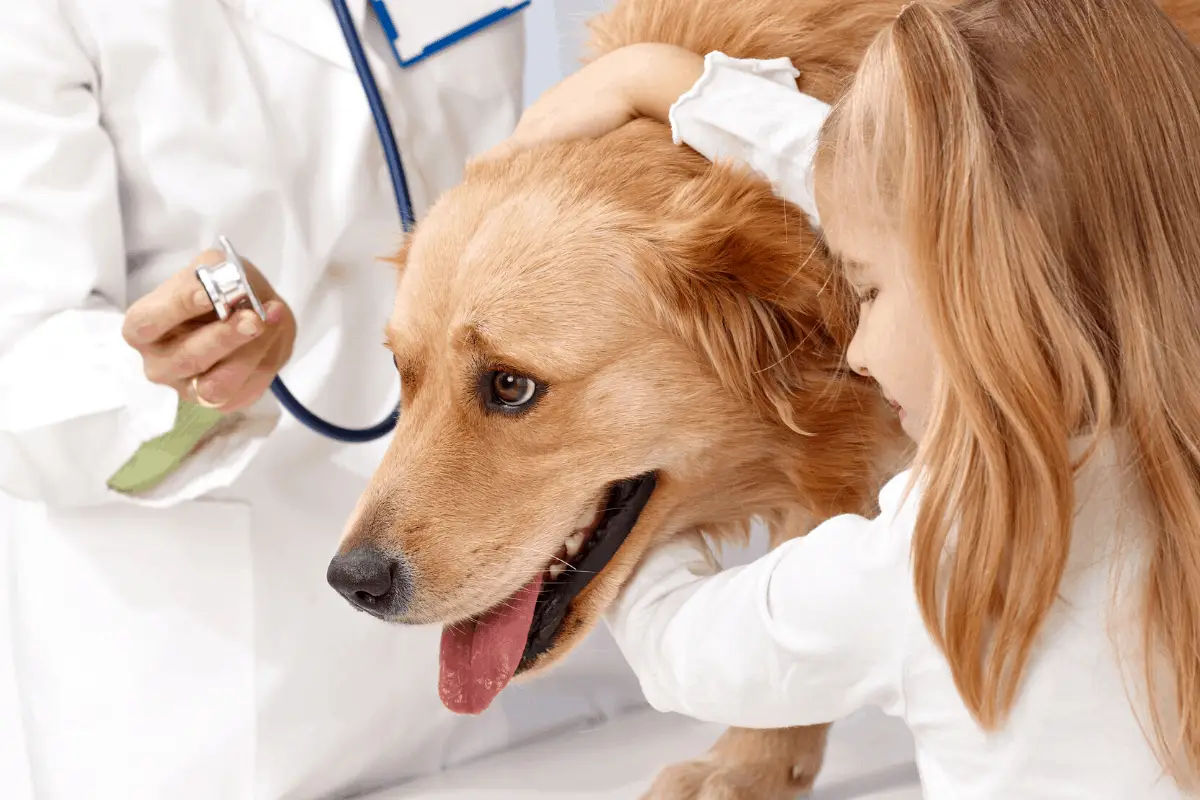One of the biggest health problems our pets face today is obesity. Golden Retrievers that are overweight or obese are at risk of many preventable health conditions. It is also much easier for a dog to put on weight than it is to get extra pounds off. That is why in this article we will discuss ways to prevent your pup from becoming obese in the first place.
Table of Contents
Steps to Avoid Obesity in Golden Retrievers
How do you avoid obesity in Golden Retrievers? In order to avoid obesity in your dog you must:
- Feed the Right Amount of Food
- Avoid Fatty/High Calorie People Foods
- Have a Healthy/Safe Treat Routine
- Provide Exercise Time
These four steps, along with regular visits to your veterinarian, will go a long way in avoiding an overweight dog.
Below we go into more details on each of these steps, health issues that come with obesity, and other things to consider.
Feed the Right Amount of Food

It is imperative that you consult with your veterinarian throughout your dog’s life regarding how much food they should be eating. This will change regularly through their life as they experience different life stages. To learn more, see our article Golden Retriever Feeding Chart.
Your growing puppy and adolescent Golden Retriever may seem to eat and need more calories per day than your adult and senior-aged Golden Retrievers. This is because as they age, their activity levels may decrease and their metabolism may also start to slow down.
It is important to note that after a dog is spayed or neutered, their metabolism will be slower than a dog who is not fixed. Once they are full grown they will typically not need to eat as much food portions as is usually recommended on bags of dog food. The recommended amount of food portions on most dog food bags accounts for dogs with high energy needs, such as non-spayed dogs who are also very active.
There is a good chance this recommends way too many calories for your particular dog to eat per day. Your veterinarian can work with you to calculate exactly how many calories your dog should eat per day based on their current weight and activity level. They can then translate this information into how many cups of food you should feed them each day.
Avoid Fatty & High Calorie People Foods
An easy mistake pet owners make is offering table scraps to their pups. They want to show their pup just how much they love them by sharing their food with them. Not only does this have the potential to lead to obesity in dogs, but it can also cause your dog to develop bad habits, such as begging or grabbing food off of the table.
If your dog learns to do these things, there is the possibility they may eat foods that are toxic to them. This can lead to expensive veterinary bills and even be life-threatening for your dog.
If it is very important to you that you share human food with your canine companion, rest assured- there are safe and healthy foods you can give to them.
Safe, healthy human foods you can share with your dog include:
- Fresh green beans
- Peeled bananas
- Low fat cottage cheese
- Cooked rice
- Cooked pasta
- Cooked, lean hamburger meat (leave off any spices)
- Baked or broiled chicken breast (no bones and not fried!)
When you do offer these healthy alternatives to table scraps, put them in your dog’s food bowl. Do not hand it to them, throw it to them, or allow them to eat it off of your plate. Doing this will help decrease the chances your dog will start begging you for your foods and/or steal food off of your plate.
Always make sure to not give any food with bones in it to your dog, even if the bones seem small. Even Golden Retrievers can get an intestinal obstruction from bones if the bone gets caught within the intestines. The bones can also irritate the lining of the gut, leading to vomiting and diarrhea.
Healthy and Safe Treat Routine
If you give your dog treats throughout the day, you will need to decrease how much food you give them at mealtime. Even seemingly little treats still contain calories. And these calories can add up.
Your treat bag should say how many calories are in each treat. You can use this as a guide to know how much you should decrease your dog’s mealtime food portion based off of how many treats you gave them that particular day.
Additionally, try to get low calorie treats and avoid the ones high in sodium. Treats that are effective at keeping your dog’s teeth clean are good options. Check out our article on the Best Treats for Golden Retrievers to learn more.
Provide Exercise Time

Exercise, exercise, exercise!!! This is probably one of the most important ways to keep your Golden Retriever from packing on the pounds. Even though Goldens aren’t necessarily the most active dog breeds out there, they still can have a lot of energy and enjoy playing.
Regular exercise will keep their metabolism up to speed. Exercise will also help strengthen and maintain their muscle mass, which can help decrease the negative effects of arthritis and other joint issues they may start to develop as they get older. Staying active is also great for the health of their heart.
Maintaining a regular exercise routine with your Golden Retriever is good not only for their physical health, but for their mental and emotional health as well. A dog that has been able to release pent up energy is a content dog and less likely to develop anxiety and other behavioral disorders at home.
Exercise can come in all shapes and sizes. For some dogs and their owners this may mean going on daily runs or jogs. For others, this may mean going for regular, good paced walks around the neighborhood. Still, for others this may mean going hiking in the woods, attending agility classes, playing fetch, or making regular visits to the dog park.
Check out our article about Exercise for a Golden Retrievers to learn more.
Health Problems Associated with Obesity
There are many health problems associated with obesity once it sets in. Dogs who are overweight and obese are at a higher risk for developing the following conditions:
- Diabetes
- Cancer
- Breathing problems
- Heart problems
- Debilitating arthritis
- Joint & ligament injuries, such as Cranial Cruciate Ligament Rupture
Many of these conditions are preventable by maintaining a regular exercise routine and eating healthy. Even though cancer and certain joint conditions can occur in healthy weight Golden Retrievers, the effects of those conditions may not be as severe as in Goldens who are obese.
Medical Conditions to Consider
Even though the majority of obese dogs become obese due to inappropriate feedings and inactivity, there are some medical conditions that can cause dogs to become overweight through no fault of their own (or of their owners).
The most common medical condition that can cause this is Hypothyroidism. Dogs can develop hypothyroidism at any point in their life and it causes their metabolism to slow way down.
Dogs with hypothyroidism show the following signs:
- Unexplained weight gain
- Decreased appetite
- Lethargy
- Depression
- Seeking cold places to lay
- Fur loss, usually near the base of the tail
- Recurrent skin infections
Hypothyroidism is treatable with a daily medication. If you suspect your dog may have hypothyroidism, schedule an appointment with your veterinarian. They will be able to submit a blood test to determine if this is the cause of your dog’s unexplained weight gain.
Another medical condition that can cause dogs to gain weight is Cushing’s Disease. Dogs with Cushing’s Disease have too much steroid production in their body. Sometimes this can be associated with obesity, but other times it can affect dogs that are even at healthy weights.
Dogs with Cushing’s Disease will display one or more of the following signs:
- Pot-bellied appearance
- Muscle wasting
- Excessive panting
- Increased thirst
- Increased urination
- Increased appetite
- Fur loss
- Recurrent skin infections
If you are concerned your dog may have Cushing’s Disease, schedule an appointment with your veterinarian. They can check bloodwork to help determine if diagnostic tests for Cushing’s should be considered.
Conclusion
Preventing your Golden Retriever from becoming overweight or obese is critical to helping them live a good quality life. It can help decrease the risk of them developing expensive, and sometimes life-threatening, medical conditions. It can also help them age with grace as arthritis and other painful joint conditions will be easier for them to manage.
Parting Tips to Avoid Obesity:
- Maintain a regular, consistent exercise routine with your dog.
- Check in with your veterinarian yearly, making sure you are still feeding them the right amount of food each day.
- Try to avoid giving them table scraps.
After all, prevention is the best medicine!
If you need help with your medical bills, be sure to check out picks for Best Pet Insurance for Golden Retrievers, and while you are there you can get your FREE quote!


